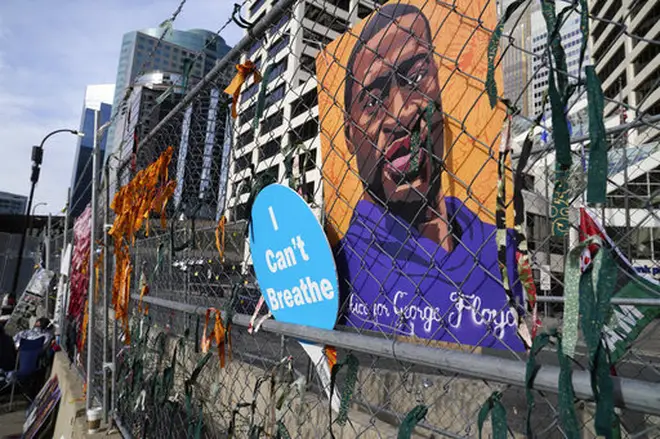
Tom Swarbrick 4pm - 6pm
30 March 2021, 18:38 | Updated: 30 March 2021, 19:41

A witness at the trial of former Minneapolis police officer Derek Chauvin over the death of George Floyd has told the court he called 911 from the scene because he believed he "was witnessing a murder".
Donald Williams, a professional mixed martial arts fighter who witnessed the fatal arrest of Floyd outside of a local convenience store, returned to the stand to give further evidence on Tuesday.
Witness Darnella Frazier, who was 17 when she went with her 9-year-old cousin at Cup Foods, filmed the infamous video seen around the world.
She has also taken the stand to deliver testimony and is being questioned on whether Derek Chauvin administered any aid or delivered CPR to George Floyd.
"No," she responded repeatedly.
Floyd was declared dead after Chauvin pressed his knee against Mr Floyd's neck for about nine minutes. He held his position as Mr Floyd said "I can't breathe”.
Prosecutors began by showing the nine-minute long videotape, shot by one of the bystanders, that showed Mr Chauvin kneeling on 46-year-old Mr Floyd.
This trial is being seen by many as a pivotal moment in US race relations.

George Floyd laid to rest
This Monday a witness told of the last minutes of George Floyd's life on the opening day of the trial of Derek Chauvin.
Donald Williams III, a witness for the prosecution, said Mr Floyd was "slowly fading away" during the nine minutes Mr Chauvin kneeled on his back and neck.
He told the court he could see Mr Floyd's life slipping away. "He's slowly fading away like a fish in a bag," he said. "His eyes slowly rolled to the back of his head" until "he didn't have no life in him no more in his body".
Prosecutor Jerry Blackwell told jurors that Mr Floyd said 27 times that he could not breathe.
Mr Chauvin's lawyer argued his use of force was "unattractive but necessary".

Hundreds join London protest against George Floyd death
Almost all of the jurors selected during more than two weeks of questioning said they had seen at least parts of the video, and several acknowledged it gave them at least a somewhat negative view of Chauvin. But they said they could set that aside.
The key questions at the trial will be whether Chauvin caused Mr Floyd's death and whether his actions were reasonable.
For the unintentional second-degree murder charge, prosecutors have to prove Chauvin's conduct was a "substantial causal factor" in Mr Floyd's death, and that Chauvin was committing felony assault at the time.
For third-degree murder, they must prove that Chauvin's actions caused Mr Floyd's death, and were reckless and without regard for human life. The manslaughter charge requires proof that Chauvin caused Mr Floyd's death through negligence that created an unreasonable risk.
Jury selection took more than two weeks, as jurors were questioned individually about their views on police, racial justice issues and pre-trial publicity in the case.
Defence lawyer Eric Nelson, in his opening statements, said that the evidence "is far greater than nine minutes and 29 seconds" of video footage.